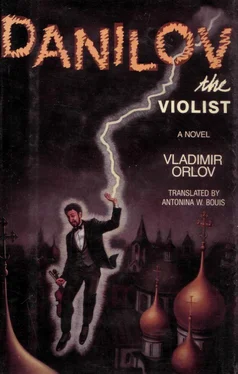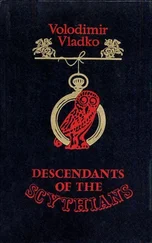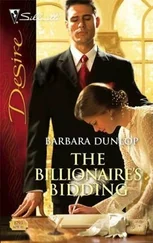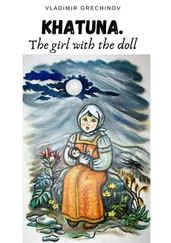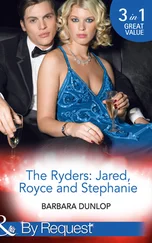At five Danilov went to the House of Culture of Medical Workers. Natasha planned to arrive after work with Ekater-ina Ivanovna. In the park Danilov looked over the posters. It looked as if there hadn't been enough paper for Pereslegin and Chudetsky.
"I hope the futecons haven't postponed the concert!" Danilov suddenly thought. "I'll show them!" he promised grimly. But he went to the House of Culture in a state of anxiety.
"Has it been postponed?" he asked Pereslegin and Chu-detsky without even saying hello.
"Why?" they asked in surprise.
"Just, uh ..." Danilov said.
But he couldn't relax. He examined his viola -- were the strings intact? And then he went to the stage and looked everything over diligently, as if he were searching for a bomb.
The audience began to come in gradually. The faces in the foyer were unfamiliar to Danilov: doctors, obviously. But then came people he knew: teachers from the conservatory, musicians, music critics. Everyone was met at the door by Chudetsky and Pereslegin. That meant that they had invited them. Then came a certain man who seemed to inspire anxiety in the composer and conductor.
"Did you invite him?" they asked Danilov.
"No," he said. "Who is he?"
"Zabyvalov," Pereslegin answered with a grimace. "Music critic."
"Great," Danilov said.
Zabyvalov, a large man, looked at everyone glumly. "He looks just like Carabos, the bad fairy," thought Danilov, "at Aurora's birthday party." Danilov had seen Zabyvalov in line at the futecons but had not known that he was a music critic. Chudetsky and Pereslegin were expecting some other people, but they hadn't shown up yet. Naturally. The most important people were always late. Or didn't show up at all.
Even though it was stupid, embarrassing even, to stand around in the foyer with his viola, Danilov stayed until his friends came. About forty people. Of course, Natasha came with Ekaterina Ivanovna. Danilov didn't know how to introduce Natasha, but Ekaterina Ivanovna introduced her to his friends, and Danilov realized that they all had known or had guessed anyway. Among the other guests there was Lena Buranova, an old friend of Danilov's and the concert mistress from the Gnessin orchestra. Buranova was expecting a child, and not only one, judging by the looks of her, but two. Everyone occupied themselves with coming up with names for the twins, and male names at that. "Leave me alone!" Buranova said. "I'm going to have a girl named Maryanochka." They asked Danilov to play gently, without too much passion, so that Buranova wouldn't get excited and have the baby right there in the hall -- at least they were in the House of Culture of Medical Workers, though. Danilov joked, too; the bantering conversation made him happy.
By now everyone Danilov was expecting had arrived, and he ran backstage. Someone called after him: "Where's the party going to be afterward?" Danilov turned to reply and saw the ruddy villain Rostovtsov entering. Danilov said nothing about the party and left.
People were already taking their seats, even though there were still crowds around the snack bar. Besides Pereslegin's symphony, the orchestra was going to do Prokofiev's Seventh. At first they had planned to end the concert with Pereslegin, but the composer had nixed the idea. According to Pereslegin, Prokofiev would save the orchestra's reputation even after his failure. "All right," Danilov decided. "I'll be done sooner. Fine."
They announced the symphony. Danilov came out in silence. How he played and what he felt he recalled later and strangely: in fragments, visions, and flashes. And yet he was accustomed to the stage, had played in halls much larger than this, when he had accompanied singers as part of an ensemble or had performed as part of a sextet. But on those occasions he had come onstage calmly, seeing and feeling all that was around him -- every speck of dust on the floorboards, every sigh, every cough in the audience. Here he was locked inside himself, he could not hear himself. No, he did hear, but as a man hears himself when he is in a hurry to speak, or has to shout something very important. Then he does not care whether he speaks beautifully or whether his grammar is correct.
And then -- it was over; his bow grew still and left the strings.
Everything was quiet.
Then everything came to life. The audience applauded loudly, kindly. They even tossed flowers onstage. Danilov took bows. The conductor Chudetsky smiled, shook Danilov's hand, and indicated Danilov to the audience, as if to say, it was all him. Danilov, in his turn, indicated Chudetsky, the French horn player, the clarinetist, the orchestra. They sought out the composer, brought him onstage, and applauded him, too.
"Is that it?" Danilov asked Pereslegin.
"But Vladimir Alexeyevich," Pereslegin said almost as an apology, "it ran forty-four minutes. How much more could it be?"
"No, that's not what I mean. The sound broke off so abruptly, in midstream..."
In the green room Pereslegin embraced Danilov, then jumped back and said seriously: "You played more than I wrote ... you created something powerful! Terrifying, proud, lofty ..."
"How could I play more than what you wrote?" Danilov said with surprise. "And I didn't play it, the orchestra did, I was the soloist -- "
"Don't argue with me," Pereslegin said. "I heard every-thing, even though I was hiding in a corner... You didn't play that way at rehearsals ... though that's understandable..."
Danilov was having his doubts anyway, and he surreptitiously looked at his bracelet. No, he had been fully human onstage. An important musician came over and announced to Pereslegin:
"Sir, your work will revolutionize music -- "
"No, no!" Pereslegin almost screeched. "Why do you say that?! My music is the most traditional ... well, some contemporary rhythms and voices may have been included, that's all -- "
"My dear sir," the great musician said, shaking his head, "it just seems that way to you." Here he bowed to Danilov. "And your playing, young man, is like no other."
He excused himself, saying that a lady awaited him in the lobby, and left.
"Yes, like no other!" Pereslegin said disappointedly. "Polite words."
Chudetsky ran in and asked if Danilov and Pereslegin would be listening to the Prokofiev and, if so, from where. Danilov said from the audience. But he felt that he couldn't listen to anything else today; he would gladly have headed for home, but that wouldn't have been fair to the other musicians. He waited for the third bell and quietly went into the theater. He left his viola backstage -- what did it matter now? He sat on a hard chair and came back to his senses. It was like decompressing after coming up from a deep pit. He no longer felt tired; he grew more and more excited, and even though he felt that he had played well, he now wanted to play Pereslegin's symphony again right there and then. He began humming his part. People shushed him in the dark.
"Excuse me," Danilov muttered, returning to reality.
The orchestra was playing Prokofiev. Danilov liked Prokofiev, but he had a hard time controlling himself. "If they only let me back onstage now!" And then the Prokofiev ended.
Danilov ran onstage to congratulate the orchestra members and Chudetsky, but he couldn't find the appropriate words. He just mumbled something joyous. Of course, no one seemed to expect appropriate words; warm feelings were needed, that was all. And Danilov had warm feelings.
Then everyone started trying to figure out whether they should all go somewhere and whether they should all go together. Danilov looked for Pereslegin, but he had vanished. Or was hiding in some corner. Danilov's friends were in the lobby, and they started telling him again how good he looked onstage with his viola and bow tie, the picture of a dashing musician. Muravlyov rebuked Danilov for his lack of passion: Buranova had been excited by his playing, but not enough to give birth.
Читать дальше
